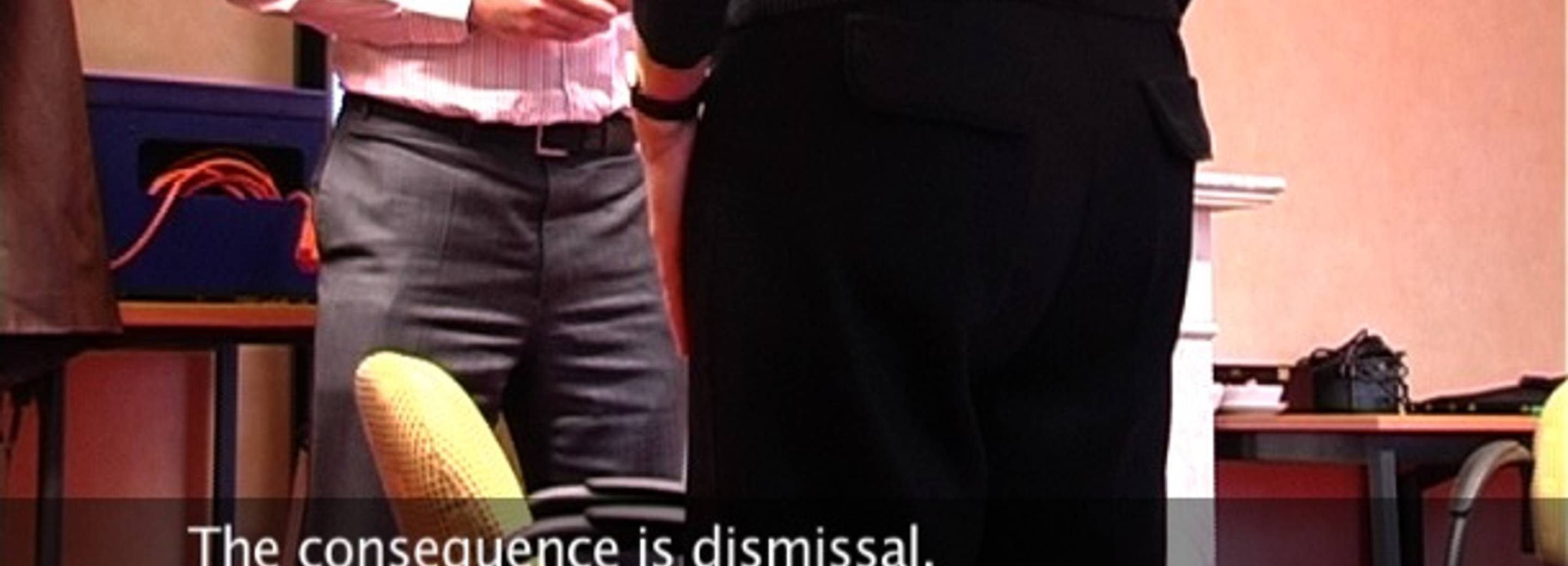MARIANNE FLOTRON – PILVI TAKALA
Curated by Luigi Fassi
What kind of transformation is the world of work now undergoing on a global scale? And what is the relationship among the various models of flexibility and creative work? Has the end of the rigid Fordist model truly generated a freer, more dynamic and humane working environment, or has it only superficially altered its own methods to achieve production aims?
The exhibition approaches these complex topics by presenting the work of two artists who engage the subject with a particular degree of attention and profound analysis. Despite the diversity of their artistic approaches, Marianne Flotron (born in 1970, Switzerland) and Pilvi Takala (born in 1981, Finland) apply comparable modes of analysis, such as role-playing and the simulation of identity, to penetrate closed professional systems so as to analyse how they work. In both cases they examine how dependent employment creates an advanced laboratory of social programming, psychological control and mental submission, ultimately transforming the individual employee into a domesticated instrument of profit in order to prevent any resistance towards the system to which they are bound.
Fired (2007) was realized by Flotron inside a Dutch company during an actual technical and psychological training session intended to teach managers how to fire employees. Applying role-playing techniques, an instructor stages a meeting where she plays the role of an employee who has been called into an office to receive notice of the termination of her employment. In fact, the word “fire” is never once uttered during the dialogue. In this way, managers learn to consciously avoid any term that might be too direct, favouring instead an approach aimed at disarming any potential emotional aggressiveness on the part of the employee, up to the point of convincing the employee in question of the inevitability of the corporate decision.
Work (2011) is the result of a long-term experiment undertaken by Flotron within a large private insurance company based in Amsterdam. It serves as an exemplary structure for a creative working relationship within the greater corporate context of the new millennium: the company offers its employees proper salaries, decent benefits and great scheduling flexibility, allowing the workers a rather free use of the office so long as they achieve target outputs. Realized in form of a workshop for the employees, the work reveals how the contemporary corporate model, founded on creativity, flexibility, flexitime and emotional and personal identification with the job, is in fact founded on an anti-democratic and strongly hierarchical logic, ultimately targeted at turning the employee into a well-trained pawn who voluntarily consents to an attitude of intellectual passivity towards the company.
In order to realize The Trainee (2008), Pilvi Takala spent one month as a trainee at the Finnish offices of Deloitte, a multinational consulting company. During this month, the artist, who had assumed a fictitious name (only a small number of persons were informed about the project), spent entire days seated at her desk without doing anything. She justified this behaviour to her fellow employees as creative brain work. Takala’s impact was like that of a virus, deconstructing from inside in provocative terms the logic of corporate productiveness, going so far as to place in question the actual sense of the corporate profit targets. The inactivity of this brain work, which appears to the Deloitte employees as a threat to their professional identity, in fact represents an open rupture within the cult of obedience to and identification with the company. In this way, Takala’s critique assumes the flavour of a consciously nihilist activism, as it is precisely idleness and absolute inaction that turns out in this context to be the most radical gesture possible, a denunciation of a lack of absolute sense becoming a strong antithesis to the ideology of corporate work as practiced in the new millennium.
With the kind support of:
Provincia Autonoma di Bolzano, Alto Adige, Deutsche Kultur
Fondazione Cassa di Risparmio, Alto Adige
Città di Bolzano, Ufficio Cultura
Mondriaan Fund, Amsterdam
Pro Helvetia, Zurich
boConcept Store, Bozen/Bolzano
